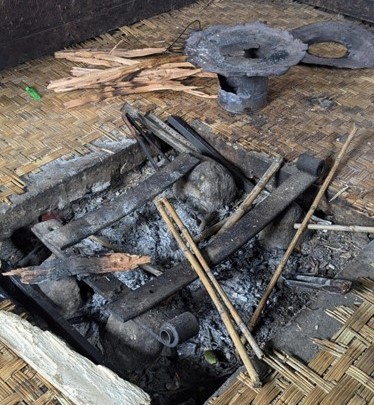Recently TEM’s CEO, Adrian Enright, travelled to the Highlands of Papua New Guinea to visit our TEM office and support the local team with the rollout of our clean cookstove project. Here Adrian reflects on his experience and discusses the parallels between corporate carbon financing and the community benefits of carbon projects. At the heart of this connection were a team of locals determined to leave their mark.

Empowering communities
In the lush mountainside of Ialibu, 4,300 metres above sea level, in the Southern Highlands Province of Papua New Guinea (PNG), 30 local TEM staff begin the house registration process for the TEM Improved Cookstoves project – the first carbon finance cookstove project in PNG. They make up six deployment teams that complete approximately 600 household registrations per day as we prepare to distribute 20,000 clean cookstoves in the area during this first phase which will take months to complete.
This stage of the project is centred around community engagement and involves speaking with each household, seeking consent and informing them of the process between now and when the cookstoves are delivered. It’s part of an intricate, careful process of community consultation that is carried out by the local TEM team in language.
Simone* is a member of our newly employed field staff who suffers from a limb difference, which makes employment an even greater challenge in an area where job prospects are defined by vast remoteness, limited education and a lack of electricity. Simone is also one of many women employed as part of the PNG team, which has achieved a 50/50 gender balance.
Simone spoke of how she learned to use the improved cookstove, understanding what it could offer to her family and her people. Simone’s commitment to the project and local community was evident in her unwavering smile and pride in her TEM uniform.

The improved cookstoves Simone and the team are preparing to deploy will generate an estimated 70,000 carbon credits per annum under the newly approved Verra method. The carbon credits are generated by measuring over time the emissions saved through the reduced pressures placed on forests for fuelwood collection. The improved cookstoves utilise PowerSolve technology to accurately track the carbon data from each device.
From villages to boardrooms
The carbon credits generated from this clean cooking carbon project are then purchased in a range of ways; by consumers choosing to carbon offset their flights, by organisations offsetting their business operating emissions, and an emerging set of buyers complying with government regulation.
The investments these organisations make are part of a very different, and equally careful process of commercial negotiations that take place in the less lush surroundings of corporate boardrooms. In these rooms, choices are being made around project integrity, location, alignment to company values and ultimately, the prices of an ever-evolving global marketplace for carbon.
While these conversations may be less spectacular in their settings, they are critical to providing the long-term financial security to climate action projects like TEM’s in PNG.
Lifelong benefits of clean cookstoves
Back on the ground, the technology at the centre of this change is a simple, yet highly effective everyday appliance – a cookstove. In PNG, approximately 80% of people still rely on burning timber in open fireplaces as a means of heating and cooking at home.
In Ialibu, we’re welcomed into the home of Janet*, a mother of four. The youngest who is one year old is clutched in her hand as she shows us her open fireplace in the centre of her home where she cooks the family meals.
Janet explains how each of her school age children are tasked with bringing home firewood 3-4 days a week on their way home from school. The walls of Janet’s home are blackened, the scars from the open fireplace, and it’s not hard to imagine the smoke the family is exposed to when carrying out the day’s cooking.

Janet spoke of her excitement about the TEM clean cookstove and what she has learnt in the education phases of the community engagement. In particular, the fact that her children will need to bring home less firewood which costs them about 2 Kina (Aud 75 cents) for 6 pieces of timber that may last a day or two.
We estimate that each household will save around Kina 540 per year through the introduction of the improved cookstove which are provided at no cost to households. This is meaningful in communities where subsistence farming remains the dominant form of getting by.
Overcoming challenges together
The size of these types of carbon projects are largely dependent on the scale of the decarbonisation ambition of corporations and governments. These ambitions are challenging to navigate for sustainability teams shaping corporate agendas and pushing for change.
As we rollout this project, the TEM team on the ground also face many challenges including, fuel shortages and the logistics of navigating tough terrain to reach each of the villages.
The team take these challenges head-on and are driven by their shared passion to create lasting impact and benefits to the local communities. In much the same way, those around the corporate boardrooms also see this as an opportunity to make their mark by accelerating their organisations sustainability ambitions and rate of decarbonisation.
While the challenges are different, the purpose is very much aligned, and there is an obvious connectiveness that is all too often forgotten. A gentle reminder to anyone in the marketplace to ensure we can see through the challenges and imperfections of the current market systems, and double down on our efforts to achieve progress.
If we get that balance right, we can all take assurance of our small but critical role in making the lives of Janet and others across the world just a little bit better.
If you’d like to learn more about our PNG Improved Cookstove project and would like to discuss how you can support, please contact us.
*Names have been changed to ensure anonymity